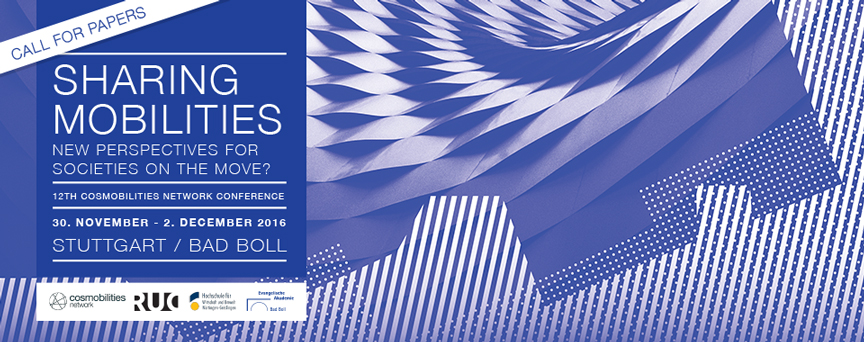Sharing Mobilities – New Perspectives for societies on the move?
Keynotes
Bridgette Wessels (University of Sheffield), Tim Cresswell (Northeastern University, Boston), Philipp Rode (London School of Economics) John Urry memorial session: Roundtable conversation on the legacy of John’s work on the mobilities turn in social science.
Fishbowl session
Sharing mobilities from a practitioners perspective: Invited speakers from mobility-related industry and city planning will engage with conference participants in a lively, moderated discussion.
Moving on – Closing Panel
Mimi Sheller (Drexel University), Kevin Hannam (Edinburgh Napier University), Sven Kesselring (Nürtingen-Geislingen University). The panelist will pick up on themes they have encountered throughout the conference and engage with conference participants in a discussion on the future of sharing mobilities.
Conference scope
The mobility world is massively changing. New policies, new modes of transport and new socio-spatial practices of mobilities are on the rise. Jeremy Rifkin saw this clearly in 2000. In his bestseller ‘The Age of Access’ he says the future of modern societies will no longer be solely organized through individual property and ownership. Rather, new collaborative forms of consumption and sharing would play a key role in the organization of everyday life and business. In fact, new cultures of sharing and participation are emerging: people share cars, bikes, houses, expertise and mastery in science and craftsmen’s work etc. Once radical visions have become part of the lingering but steady transformation of norms, procedures, routines and capitalist principles. A burgeoning political awareness can be witnessed in cities, regions, in mobilities research, planning, politics, business and civil society. Even global car producers are becoming part of the new sharing culture and seriously considering themselves as selling mobility instead of cars.
Where does this social change come from? Why is ‘sharing’ an appealing idea? Can we expect a new mobility regime and growing markets for ‘sharing mobilities’? Or is this just a new fashion, a new trend, or furthermore, greenwashing? Does it provide the access that Rifkin was foreseeing, in terms of more equality, or even sustainable mobilities?
For the Cosmobilities Network, the biggest European mobility research network, it is about time for a critical scientific investigation of this topic. Therefore, the 12th Cosmobilities Conference invites contributions on the following questions:
• What are the social, ecological, cultural and aesthetic dimensions that generate this resonance of ‘sharing mobilities’?
• Are we observing the birth of a culture of multimobility, of changing (auto-) motive emotions and of sustainable mobilities?
• What are the socio-political implications of a new mobility culture?
• Is the hype on sharing mobilities just an expression of the pursuit of big business and the next phase of capitalist development?
• Are new mobilities arising as a ‘common good’? Or rather as a social and cultural resource in a cosmopolitan world full of social, ecological, economic and cultural risks?
• What does ‘sharing mobilities’ mean against the background of global migration and tourism flows and what is its impact on networked urban mobilities?
The 12th Conference of the Cosmobilities Network invites contributions which focus on the social, cultural, spatial, ecological and socio-economic consequences of new sharing concepts. Papers and contributions elaborating aspects of their related risks, chances, utopias and dystopias are in particular welcome.
The Cosmobilities Network encourages scholars and practitioners to present and discuss theoretical, conceptual, empirical and applied work as well as perspectives on the past, present and future of sharing mobilities. Cosmobilities conferences aim to foster inspiring, creative and thought-provoking environments. The majority of sessions will foster exchange and discussion. Therefore, we especially encourage participants to submit abstracts for the 7/7 and the panel sessions.


